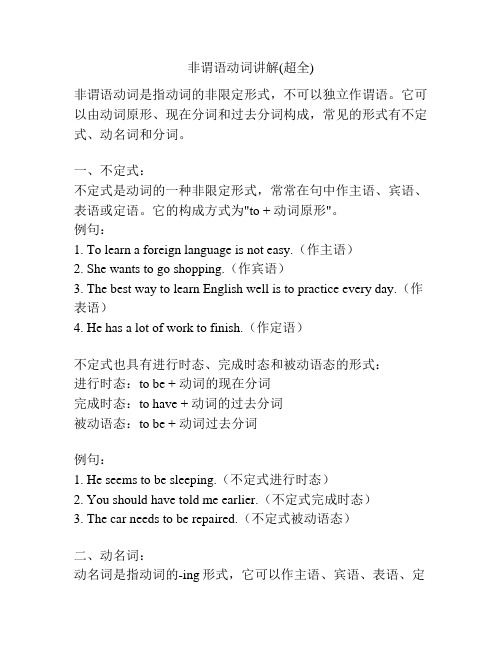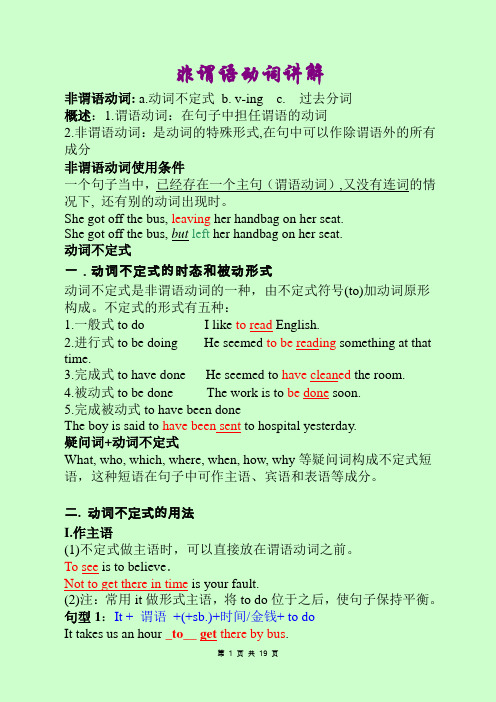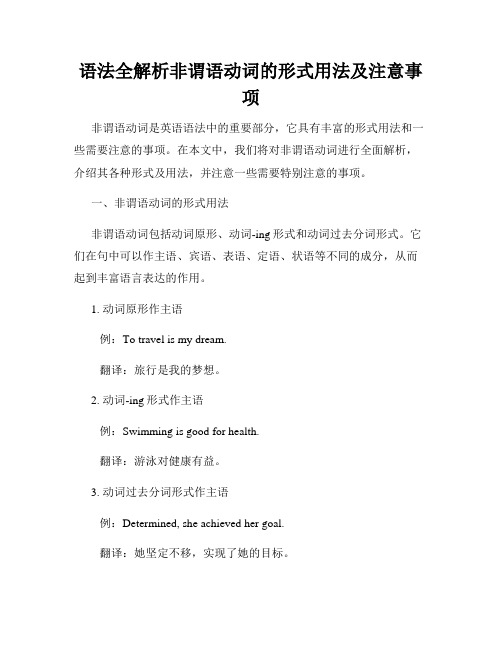专四语法(非谓语动词)解读
非谓语动词讲解(超全)

非谓语动词讲解(超全)非谓语动词是指动词的非限定形式,不可以独立作谓语。
它可以由动词原形、现在分词和过去分词构成,常见的形式有不定式、动名词和分词。
一、不定式:不定式是动词的一种非限定形式,常常在句中作主语、宾语、表语或定语。
它的构成方式为"to + 动词原形"。
例句:1. To learn a foreign language is not easy.(作主语)2. She wants to go shopping.(作宾语)3. The best way to learn English well is to practice every day.(作表语)4. He has a lot of work to finish.(作定语)不定式也具有进行时态、完成时态和被动语态的形式:进行时态:to be + 动词的现在分词完成时态:to have + 动词的过去分词被动语态:to be + 动词过去分词例句:1. He seems to be sleeping.(不定式进行时态)2. You should have told me earlier.(不定式完成时态)3. The car needs to be repaired.(不定式被动语态)二、动名词:动名词是指动词的-ing形式,它可以作主语、宾语、表语、定语或状语。
在句中的位置和用法与名词相似。
例句:1. Reading is my favorite hobby.(作主语)2. I enjoy swimming in the summer.(作宾语)3. Her dream is becoming a famous singer.(作表语)4. The girl standing over there is my sister.(作定语)5. He went to the party without saying goodbye.(作状语)动名词与不定式的区别在于动名词具有进行时态和被动语态,而不定式没有。
专四练习之语法2(非谓语动词,独立结构、悬垂结构)解读

2. 非谓语动词作宾语
1.to do 和doing可作宾语,done不行 To do 表未完成或未发生,doing表已完成或已 发生。 1)接to do的动词:afford/agree/aim/apply arrange/ ask/ beg/ choose/ claim/ dare/ decide/ decline/ demand/ desire/ determine/ expect/ fail/ guarantee/ hope/ manage/ offer/ ought / plan/ prepare/ presume/ pretend/ proceed/ promise/ refuse/ request/ resolve/ seek/ strive/ swear/ threaten/ undertake/ volunteer/ wish 等
3.非谓语动词作补语的要点提示
1. 现在分词表动作正在进行, 过去分词表被动, 不定式表动作已完成或结束 2.补语如果是非持续性动词,不定式表 一次性的动作,现在分词则表示反复发 生的动作。
I. 非谓语动词
非谓语动词讲解(超全超实用)

非谓语动词讲解非谓语动词: a.动词不定式 b. v-ing c. 过去分词概述:1.谓语动词:在句子中担任谓语的动词2.非谓语动词:是动词的特殊形式,在句中可以作除谓语外的所有成分非谓语动词使用条件一个句子当中,已经存在一个主句(谓语动词),又没有连词的情况下, 还有别的动词出现时。
She got off the bus, leaving her handbag on her seat.She got off the bus, but left her handbag on her seat.动词不定式一.动词不定式的时态和被动形式动词不定式是非谓语动词的一种,由不定式符号(to)加动词原形构成。
不定式的形式有五种:1.一般式to do I like to read English.2.进行式to be doing He seemed to be reading something at that time.3.完成式to have done He seemed to have cleaned the room.4.被动式to be done The work is to be done soon.5.完成被动式to have been doneThe boy is said to have been sent to hospital yesterday.疑问词+动词不定式What, who, which, where, when, how, why等疑问词构成不定式短语,这种短语在句子中可作主语、宾语和表语等成分。
二. 动词不定式的用法I.作主语(1)不定式做主语时,可以直接放在谓语动词之前。
To see is to believe.Not to get there in time is your fault.(2)注:常用it做形式主语,将to do位于之后,使句子保持平衡。
句型1:It + 谓语+(+sb.)+时间/金钱+ to doIt takes us an hour _to__ get there by bus.It costs you only $ 100 a month to cook at home.It seemed impossible to save money.句型2:I t’s + n. (+ for sb) + to doIt’s our duty _to_ help the poor.It is a great enjoyment _to_ spend our holiday in the countryside..It is a great honor for us to be present at your birthday party.句型3:It is + adj (+ for sb)to do sth(是形容事物的性质的)It is + adj (+ of sb)to do sth(是形容人的品质的)It is easy for me to finish this work before ten.It is very kind of you to give me some help.It's impolite of you to speak to the teacher like that.疑问词+不定式作主语When to start remains undecided.1.It is easy to get there by bus or taxi.2. It takes about 3 hours to see all the birds.3. It is also impolite to speak with your mouth full when you are eating.4. It’s our duty to take good care of the old.5. How long did it take you to finish the work?6. It is stupid of you to write down everything the teacher says.7. When to start has not been decided.8. It seemed selfish of him not to give them anything.9. It’s necessary for you to lock the car when you do not use it.10. It is useful for our health to do morning exercises.II.作宾语接不定式做宾语I want to know this matter.I don’t expect to meet you here(1)常见动词有:like, demand, expect, promise, begin, determine, refuse, fail, manage, learn, seem, forget, want, prepare, pretend, plan, wish等They want to get_( get ) on the bus, didn’t they?He said he wished __to be ( be ) a professor.(2)it作形式宾语I find/feel to work with him interesting .I find/feel it interesting to work with him.Subject+ find/think/feel/make/ consider… it+adj/n + to do sth.1.We thought _it__ better __to_ start early.2.Do you consider _it__ better not _to_ go?3. I feel _it_ my duty _to_ change all that.4.We think it __ important _ to _ obey the law.5.I know _ it _ impossible _ to _ finish so much homework in a day.(3)疑问词+不定式作宾语常常放在这些动词的后面作宾语:tell, advise, show, teach, find out, decide, discuss, learn, explain…He taught us how to use the tool.No one could tell me where to get the book.The dictionary didn’t tell the Frenchman how to pronounce the word.(4) 作介词but, except, besides的宾语。
语法全解析非谓语动词的形式用法及注意事项

语法全解析非谓语动词的形式用法及注意事项非谓语动词是英语语法中的重要部分,它具有丰富的形式用法和一些需要注意的事项。
在本文中,我们将对非谓语动词进行全面解析,介绍其各种形式及用法,并注意一些需要特别注意的事项。
一、非谓语动词的形式用法非谓语动词包括动词原形、动词-ing形式和动词过去分词形式。
它们在句中可以作主语、宾语、表语、定语、状语等不同的成分,从而起到丰富语言表达的作用。
1. 动词原形作主语例:To travel is my dream.翻译:旅行是我的梦想。
2. 动词-ing形式作主语例:Swimming is good for health.翻译:游泳对健康有益。
3. 动词过去分词形式作主语例:Determined, she achieved her goal.翻译:她坚定不移,实现了她的目标。
4. 动词-ing形式作定语例:The running water is clear.翻译:流水清澈。
5. 动词过去分词形式作定语例:The broken vase needs to be fixed.翻译:那个破碎的花瓶需要修理。
6. 动词原形作宾语例:I want to learn English.翻译:我想学英语。
7. 动词-ing形式作宾语例:She enjoys reading books.翻译:她喜欢读书。
8. 动词过去分词形式作宾语例:We have finished our homework.翻译:我们已经完成了作业。
9. 动词-ing形式作状语例:He left without saying goodbye.翻译:他走了,没有说再见。
10. 动词过去分词形式作状语例:Exhausted, she fell asleep quickly.翻译:她累得很,很快就睡着了。
二、非谓语动词的注意事项在使用非谓语动词时,需要注意以下几个问题:1. 动词-ing形式与动词过去分词形式的区别动词-ing形式表示正在进行的动作,而动词过去分词形式则表示已经完成的动作或状态。
大学英语非谓语动词语法大讲解

大学英语非谓语动词语法大讲解导语:非谓语动词也称非限定动词,是动词的非谓语形式。
它在人称和数方面不受主语的限制,但也保留了动词的若干特征,如时态变化、语态变化,可以带宾语,可以被状语修饰等。
非谓语动词形式包括不定式、动名词和分词。
下面YJBYS店铺向大家讲解非谓语动词,欢迎参考!第一节不定式不定式有两种形式:一是带to的不定式,一是不带to的不定式,后者即通常所谓的动词原形。
动词不定式主要起名词、形容词和副词的作用,同时又保留了动词的某些特征。
不定式在句中可用作主语、表语、定语、同位语、状语和补语等。
一、动词不定式的形式动词不定式的形式如下表所示:二、不定式的功用1.不定式作主语例1:To see is to believe.百闻不如一见。
例2:To err is human,to forgive,divine.犯错误是人之常情,宽恕是超凡的。
英语中常用it作形式主语,而将真实主语动词不定式放在谓语之后,从而形成“It+谓语+作主语的动词不定式”结构。
经典考点1:It is quite necessary for a qualifiedteacher to have good mannersand knowledge.(CET-4,1996年1月)A)extensive B)expansive C)intensive D)expensive巧解本题应选A。
四个选项的意思分别为A)广博的;B)扩展的,拓展的;C)精心的,专注的;D)昂贵的。
全句意思是:一个称职的教师必须有良好的举止和渊博的知识。
经典考点2:It took him several months to the wild horse.(CET-4,1995年6月)A)tend B)cultivate C)breed D)tame巧解?本题应选D。
四个选项的意思分别为:cultivate作“培养,培育”讲;breed表示“饲养,繁殖”;tend表示“易于”;tame表示“驯服”。
专四语法考点串讲之三 非谓语动词

• I have a lot of homework to do. • We were waiting for the door to be opened. • .
• 完成式 •
to have done to have been done 分词动作比谓语动作的发生早
• •
eg. I'm sorry to have lost your key. I am happy for the article to have been finished in time.
• 注意:why +动词原形或not+动词原形。
• •
。Why
make so much noise 为什么发出这么大的噪音? Why not join us 为什么不加入我们?
• 3. It is + 形容词 + for of sb + to do 结构 • Eg. It's kind of you to think so much of us. • 难为你这么为我们着想.
用完成式。
Eg. Having done his homework, he began to watch TV. • • Having heard this, the woman expressed her satisfaction
考点四:不定式做状语四结果三目的 (必备)
• 一、不定式表结果 • 1) so(such) ... as to do 如此…以便(表结果) • Would you be so kind as to lend me your bicycle? 把你的自 行车借给我好吗? • 2) enough to do • He didn‘t run fast enough to catch the train. 他跑得不够快, 没赶上火车。 • 3) too ... to do • His eyesight is too poor to read such small letters. • 4)only to不料(却)……,结果(却)……",表示坏的结果 • I went to shopping, only to find it was closed.
专四语法非谓语动词

English and recognize how it is used.
(3)如果其形容词形式要求接不定式做补语, 相应的名词一般用不定式做定语。如: ambition to do “干……的雄心” →be ambitious to do“有雄心干……” curiosity to do “对……的好奇心” →be curious to do“对……好奇” ability to do“做……的能力” →able to do“有能力做……”
2.不定式做宾语 掌握要求接不定式做宾语的动词:
afford, arrange, attempt, claim, desire, determine, expect, fail, guarantee, endeavor, intend, pledge, pretend, resolve, request, swear,
the door, only to find it locked.
The three men tried many times to sneak across the
border into the neighbouring country, only to be captured by the police each time.(99年)
changes taking place in our ever-increasing world.(相当于the changes which take place...)
There was a very interesting remark in a book by an Englishman that I read recently giving what he thought was a reason for this American characteristic.(相当于which gave...)
四级语法讲座2:非谓语动词

分词作状语与独立主格结构
要注意区分分词作状语与独立主格结构,前者的逻辑 主语是与句子的主语是一致的,而后者有自己的主语, 即分词的前面有名词/代词,否则句子的意义就不通。 如: Getting dark, I left in a hurry. 这是个错句。正确的形式是在分词前加上它的主语it. 再如: Stepping on the platform, the audience gave John a thunderous applause. 这个句子的真正意思是想说:当John登上舞台的时候, 观众爆发出雷鸣般的掌声。正确的说法应是: Stepping on the platform, John received/was given a thunderous applause.
语态
1. Sir Denis, who is 78, has made it known that much of his collection ______to the nation. (96/6/24) 【D】 A) has left B) is to leave C) leaves D) is to be left 2. If I correct someone, I will do it with as much good humor and self--restraint as if I were the one ______. 【D】 (96/6/28) A) to correct B) correcting C) having corrected D) being corrected 3. Corn originated in the New World and thus was not known in Europe until Columbus found it ______ in 【B】 Cuba. (00/1/45) A) having cultivated B) being cultivated C) been cultivated D) cultivating
- 1、下载文档前请自行甄别文档内容的完整性,平台不提供额外的编辑、内容补充、找答案等附加服务。
- 2、"仅部分预览"的文档,不可在线预览部分如存在完整性等问题,可反馈申请退款(可完整预览的文档不适用该条件!)。
- 3、如文档侵犯您的权益,请联系客服反馈,我们会尽快为您处理(人工客服工作时间:9:00-18:30)。
(4) 不定式的逻辑主语一般由介词for引导,但下列表 示人的性格行为特征的形容词做表语时, 不定式的 逻辑主语则由of引导: absurd, bold, brave, courageous, careful, careless, clever, wise, foolish, silly, stupid, good, nice, kind, thoughtful, considerate, greedy, generous, honest, modest, polite, rude, cruel, selfish, lazy, wicked, wrong。如: Experts say walking is one of the best ways for a person to stay healthy. It’s clever of you to have invented such a device.
• 真题示例:“The man preparing the documents is the firm’s lawyer” has all the following possible meanings EXCEPT • A. the man who has prepared the documents • B. the man who has been preparing the documents. • C. the man who is preparing the documents • D. the man who will prepare the documents
真题演练
• 1. It is not uncommon for there ____ problem of communication between the old and the young. • A. being B. would be C. be D. to be • 2. _____ at in his way, the situation doesn’t seem so desperate. • A. Looking B. Looked • C. Being looked D. To look • 3. There are only ten apples left in the baskets, ___ the spoil ones. • A. not counting B. not to count • C. don’t count D. having not counted
• (分析) 考查现在分词作定语。名词后V-ing 形式多数表示正在进行的动作,也可表示 一般的动作。前三项表示的时间都是现在, 而第四项表示的是将来。事实上,用于表 示将来时的通常使用不定式结构。故D为选 项。
• 5. 非谓语动词作状语 • 1)不定式和分词都可以作状语,表示原因、时 间、方式、伴随、让步、结果等。不定时常在 句中作目的状语,而分词一般不具备这种功能, 分词能表示时间或伴随情况,不定式却不能这 样用。例如: • He came to see me. • Singing a song, they came into the classroom. • 2)当不定式和分词有了自己的主语,便构成了 不定式和分词的独立结构。 • 不定式独立结构通常在句中作状语,表示伴随 状况;分词独立结构在句中作状语,表示时间、 伴随、原因和条件。例如:
• 1、非谓语动词作主语 • (1)不定式和动名词可以在句中充当主语, 但分词却不可以。不定式一般表示具体或 一次性动作,而动名词则表示一般或抽象 的多次动作。
• _____ is not a serious disadvantage in life. ( 2001, 51) • A. To be not tall B. Not to be tall
• 4. What’s the chance of ____ a general election this year? • A. there being B. there to be • C. there be D. there going to be • 5. The meeting was put off because we ____ a meeting without John. • A. objected having • B. were objected to having • C. objected to have • D. objected to having
• 3. 非谓语动词作补语 • 不定式和分词都可以作主语补足语和宾语补足 语,但二者表达的意义有所不同,现在分词表 示动作正在进行;过去分词表示被动意义;不 定式表示动作将要完成。如: • I heard someone singing this song. • I heard my name called. • He asked me to get in touch with her.
• 2、非谓语动词作宾语 • (1)不定式和动名词可以在句中充当宾语, 但分词却不可以。 • A. 有些动词后只能接动名词,如:abandon, acknowledge, advocate, anticipate, appreciate, avoid, admit, consider, delay, deny, enjoy, excuse, fancy, favor, finish, forgive, imagine, involve, justify, mention, mind, pardon, practice, postpone, recall,recollect,risk, resist, suggest, tolerate。 如: • I appreciate having been given the opportunity to study abroad two years ago.
• C. 有些动词后既能接不定式又能接动名词, 如:love, like, hate, begin, start, etc. 这时, 二者的差别不大,主要在于:不定式一般 表示具体或一次性动作,而动名词则表示 一般或抽象的多次动作。如: • I like getting up early. 我喜欢早起。(一种 生活习惯) • I hate to get up early tomorrow. 我讨厌明天 要早起。(一次性的行为)
• C. Being not tall D. Not being tall • [D]【详解】非谓语动词在句中作了主语。非谓 语动词的否定式,要直接在非谓语动词前加not, 因此可以直接排除[A]和[C]。动名词和不定式 都可以作句子主语,但动名词表示一贯性动作, 不定式表示具体的一次性动作。个子不高是一 贯的事实,应用动名词形式,所以[D]正确。
• • • • •
• • • •
4. 非谓语动词作定语 不定式、现在分词和过去分词都可以作定语 不定式通常作名词后置定语,如, Do you have time to help us? 一些可作形容词的现在分词常用作前置定语,此外, 一些现在分词(短语)可用在名词后作定语,相当于 一个从句。例如: Here is a van stopping(=which is stopping)outside 有很多表示情绪的过去分词,以及一些其他类型的过 去分词可用作定语。 例如:She could hear his agitated voice 激动的声音 Closed door 关着的门
We divided the work, he to clean the table and I to move the box. Time permitting, we will have a meeting. 3) 主语应与分词保持一致 主语英语分词保持一致,避免悬垂分词的出现,也 就是要避免既不带自己的主语,又不以句子主语 作自己的逻辑主语的分词短语。例如,下面的句 子就是错误的。 Hearing the terrible news, her eyes filled with tears. 改:Hearing the terrible news, she burst into tears.
• (分析)本句中主语he 和obtain 之间是逻辑上的 主谓关系,因此是现在分词短语作原因状语; 由于“没弄到票”发生在“看电视”之前,这 里应该使用现在分词的完成式,即having obtained a ticket for the match,否定词not 应 该置于整个现在分词结构之前,因此本题应该 选C。
• 4) 非谓语动词作主语和状语时,若要使用其否定 形式,则需要将否定词放在整个非谓语动词结构 之前。 • 真题示例: • _____ , he can now only watch it on TV at home. • A. obtaining not a ticket for the match. • B. Not obtaining a ticket for the match. • C. Not having obtained a ticket for the match. • D. Not obtained a ticket for the match.
• D. 有些动词后既能接不定式又能接动名词,如: remember, regret,forget, stop, mean, try, remain, etc. 此时,二者的差别很大,需要加以区别。 • 真题提示: • I never regretted _____ the offer, for it was not where my interest lay. • A. not to accept B. not having accepted • C. having not accepted D. not accepting • (分析Байду номын сангаас to regret doing sth. 表示“后悔做过某事”, 即某事已经发生了;to regret to do sth. 表示“对做 某事感到遗憾”。根据句意“我从来不后悔没有接 受那份工作,因为那并非我的兴趣所在”,可以直 接排除A。由于regret 后的内容并不是强调事情发 生的时间,所以排除B、C,所以D为正确答案。
